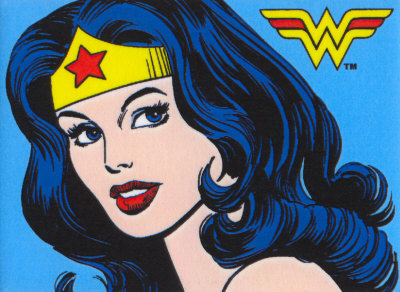Wonder Woman’s influence on my self-esteem as a child and my future aspirations cannot be undervalued.
I have no memory of doing so, but my mother said that I, at age 5, asked her, “Why don’t I have blonde hair and blue eyes?”
Perhaps I’d been swayed by my Barbie dolls, by certain Disney princesses, by the way blonde girls at school seemed to get favored, for me to say such a thing. After all, I was practically the only non-white girl in class.
My mother answered, “Everyone has their own type of beauty, all in their own colors. There are even purple people and blue people.”
She said I seemed satisfied with her answer, and never asked about it again.
Then, I found Wonder Woman.
I’d watched episodes of her TV show in the late 1970s and early 1980s. There she was, tall and brave, crowned with long black hair like mine under her golden tiara, wearing her bulletproof bracelets, and tossing her magic lasso that made everyone tell the truth (which would probably still be handy when dating people). My Korean grandmother saw an episode with the buxom Lynda Carter (who people often forget is half-Latina) and muttered in Korean, “Her breasts are huge. Does she stuff them?”
I began collecting and reading Wonder Woman comic books as well. I was able to spout the names of Greek goddesses like Aphrodite and Athena who were featured in the stories; my second grade teacher was impressed. Sadly, I made a girl at my birthday party cry when she gave me Supergirl Underoos, and I thoughtlessly said, “I wanted Wonder Woman ones.” My parents got me a set soon after. I could play her during Halloween and not need to wear a wig.
Instead of quietly crouching in the corner and playing dolls with the other girls at my parents’ friends’ parties, I began to jump in and tussle with the boys. They would play Batman or Spiderman, and I could be a perfect Wonder Woman, kicking like I had tall red boots on. I even made my own perfect magic lasso out of stretchy golden gift-wrapping cord. The boys would tell their mothers that I was more fun than the other girls.
So even when on my other favorite show, the Smurfs, the only female, Smurfette, was magically converted in her premiere episode from straight black hair to wavy blond locks, I was not insulted. Wonder Woman was the sole badass woman on Superfriends (besides her archvillain The Cheetah) and part of the Justice League of America. Even as a kid, I had some sense she was the first and best ethnic heroine (technically being Greek, I suppose).
Fast forward a couple generations later, and in the midst of a box office dominated by superhero movies, I’ve long waited and wondered when Wonder Woman would get her own. Studios scraped the bottom of the DC and Marvel Comics barrels for new male heroes (Ant Man?) for years before Gal Gadot’s casting in the legendary role in the upcoming Justice League, and now, finally, a Wonder Woman movie. (A statuesque Israeli actress, Gadot appears to have the perfect Mediterranean-Amazon look.)
There have been strange articles over the years mansplaining why Wonder Woman’s story doesn’t work with an action movie’s narrative structure, why it’s so hard to come up with a good script for her. Utter BS. I can think of plenty of riveting threads in her story. She came from a magical island of warrior women and left her sheltered home and her beloved mother to help the screwy outside co-ed world (ravaged by World War II to be exact in the original storyline). She falls in love with an American military intelligence officer, Steve Trevor, someone from a foreign land. There are plenty of fertile themes to explore, be it cross-cultural metaphors, battling spies and Nazis (which apparently never gets tiresome, as found in Captain America, Raiders of the Lost Ark, etc.), Greek mythology, homesickness, good and evil, let alone all the rich gender role reversals to explore. With all the talented writers in Hollywood, you really can’t come up with a decent script out of all that material?
I still channel my inner Wonder Woman now and then; I also grew to be unusually tall for an Asian woman and love to wear high boots at the workplace. I try to get people to tell the truth as a psychiatrist now, with a figurative magic lasso. I am dating my own kindhearted Steve Trevor, a retired military guy.
Wonder Woman will always be special because she is the original all-American female superhero; she has a historical presence that reaches almost as large as her male compatriots like Superman. The fact that she was never a conventional blondie was an added bonus that rendered her adaptable and inspiring to the different inner needs of her fans, like a true American icon. She merged toughness, sexiness, and smarts in a perfect comic book package.
As a child, her influence on my self-esteem and my future aspirations cannot be undervalued; sometimes these pop cultural images and role models matter. She deserves her own dedicated place on the cinematic stage, to inspire the next generation of young girls. They need Wonder Woman to help give them, like me, purpose and confidence in a world that still too often renders them as invisible as her famous plane.
Jean Kim is a psychiatrist and writer in the DC Metro area. She will be receiving her M.A. in Nonfiction Writing at Johns Hopkins, and has also been a nonfiction fellow at the Writers’ Institute at the Graduate Center of CUNY. She received her B.A. in English from Yale, and her M.D. from Virginia Commonwealth University. She has work published or forthcoming in The Daily Beast, Bethesda Magazine, The Rumpus, Storyscape Journal, Star 82 Review, PsychologyToday.com, In These Times, and more.
This originally appeared on Psychology Today. Republished here with permission.
Related Links:

